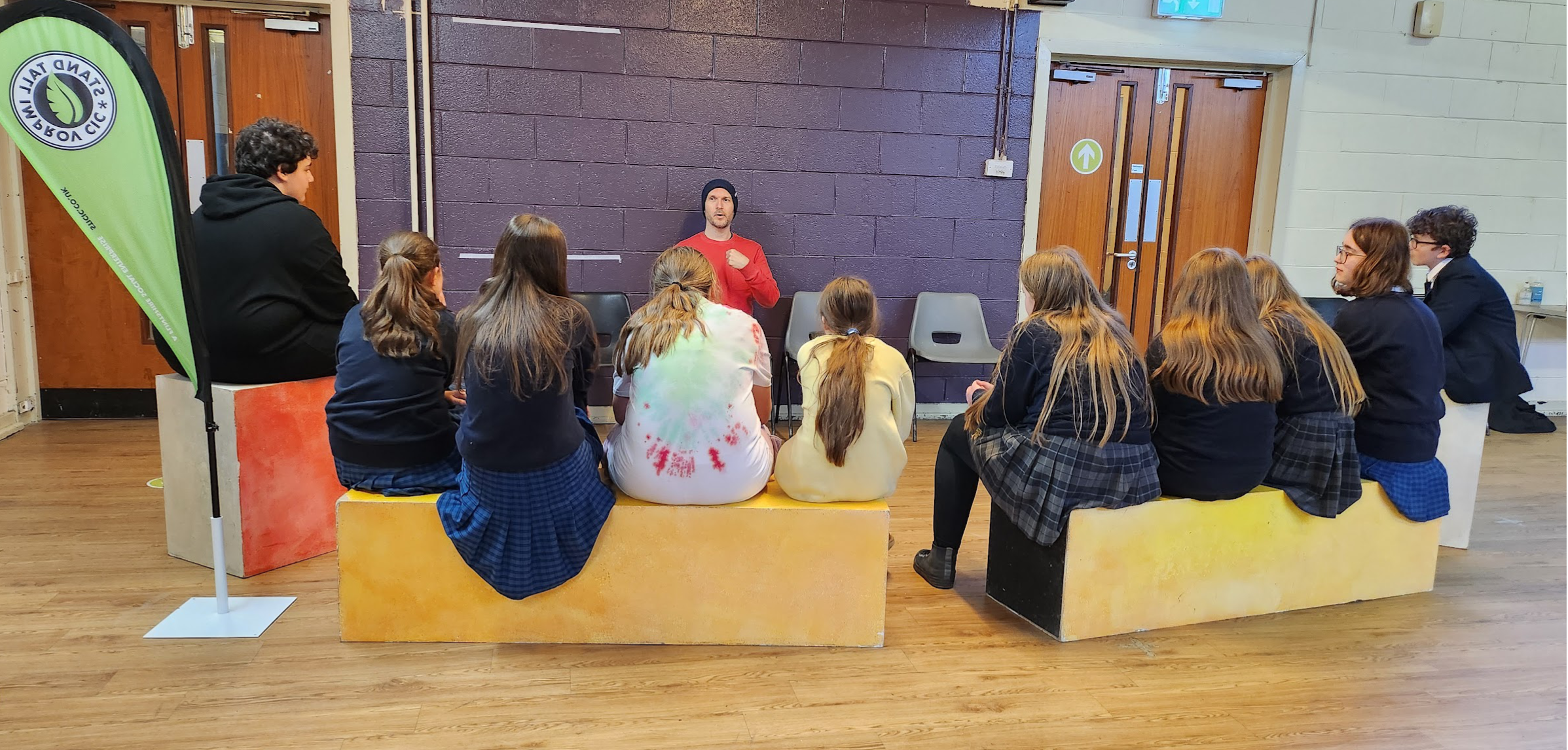Improverse: joyful expression across the landscape of education
An argument for the role of improvisational theatre in enriching imagination, articulation, critical thinking and confidence–all critical factors that bolster the Four Purposes of the Curriculum for Wales.
There is a crucial stage in the life of a young person as they go from primary school to secondary school–a little chapter, a mere few steps between being a small child to becoming a teenager–that needs a light shining on it.
More specifically, we are talking about that transition in their education; within the English educational system, this follows the move from Key Stage 2 (7-11 years old) to Key Stages 3 and 4. In North Wales, where Stand Tall Improv CIC is based, the newer system refers to the change from Progression Step 3 to Progression Steps 4 and 5.
What does this look like on the ground? A child leaves the familiar, safe world of Year 6 and enters the much bigger and unexplored world of Year 7. There are new friendship groups yet to form, a wider environment to navigate, a new set of teachers, higher academic stakes to strive for, and social norms with stronger undercurrents of communication.
An apprehension for social interaction can start early for many, and it holds an especially hefty weight on the impressionable shoulders of pre-teens. This brand new space, coupled with the chaos of biological changes expected as adolescence unfolds, combine to present pressures that become obstacles as they begin their life in secondary school.
“To be yourself in a world that is constantly trying to make you something else is the greatest accomplishment.”
What’s most at stake during this stage of a young person’s development is self expression–more specifically, the ability to create social connections with peers and forge meaningful friendships, and balance this with growing a healthy level of critical thinking and independent thought. Addressing this aspect of one’s education needs so much more than the classroom setting of lessons, which is why the Curriculum for Wales identifies Four Purposes within its framework to guide schools on activities embedded beyond the classroom, throughout other parts of a student’s time at school.
The types of enrichment activities on offer in a school play a vital role in providing a well-rounded development process. The Four Purposes requires a wide range of them, in fact. Sports ensure a healthy level of physical stamina and competition–a drive towards excellence, teamwork and active movement. Global citizenship projects ensure awareness of the wider community around the world. Project-based learning combined with STEM challenges nurture the ambition of becoming capable learners.
Two of The Four Purposes that are directly impacted by IMPROVERSE activities:
Enterprising, creative contributors
Ready to play a full part in life and work.
Think creatively, take initiative, and solve problems.
Healthy, confident individuals
Ready to lead fulfilling lives as valued members of society.
Secure in their mental, physical, and emotional wellbeing, and able to make informed choices.
This is where our commitment as a social enterprise comes in. With workshops like Improverse, we seek to nurture fundamental socialising skills such as active listening, spontaneity and a natural expectation of change and therefore thinking quickly on one’s feet in order to meet the unexpected–and the best part about the whole exercise is that this is done via fun-filled games with a focus always on working together, adjusting to other people’s ways of communicating, being very imaginative, and recognising subtext in what is unsaid.
The game of a scene teaches them to read each other’s non-verbal language and work together towards the common goal of a complete narrative. Justification games teach that skillset vital to negotiation and discourse, where one must always begin from a place of agreement whilst challenging others to consider new thoughts and ideas. Games centred around exploring the emotional wheel naturally support empathy. Object games with imagined scenery encourage mindful, intentional observation, while miming games shine a light on gesture mapping and heightened awareness of movement in a space–future public speakers who go on to debate or deliver calls to action get early practice here, to build what later becomes an easy, natural way to carry themselves in front of an audience.
The games are playful and filled with joy and surprise, but the strength of building neurological pathways this way is what makes it perfect for this age group. They reward creativity and nurture camaraderie via laughter, uniting the group and reinforcing the notion that articulating ideas and concepts can be associated with joy and appreciation–a source of strength to meet the inevitable academic pressures leading to GCSEs. This brand of confidence-building must never be underestimated. Speaking up and being able to articulate one’s feelings is a worthy ability to aid in emotional regulation and authentic self identity.
It is in fact essential that students between 11 and 17 be equipped with the abilities that improvisational theatre offers. There is no better time to reinforce and keep alive the ability to communicate, express oneself, and reach out to others and be able to stand by one’s own sense of identity. More attention is needed for this age range to take care of their wellbeing as they take on the pressures of secondary school.
We are always on the lookout for projects that can deliver this type of enrichment for students who are starting out in secondary school. In the meantime, IMPROVERSE continues to go from strength to strength, running during term-time in the activity hall of Caffi Isa, Mynydd Isa.
If you would like to enquire, join up or work with us in future projects, we are just a message away here.



